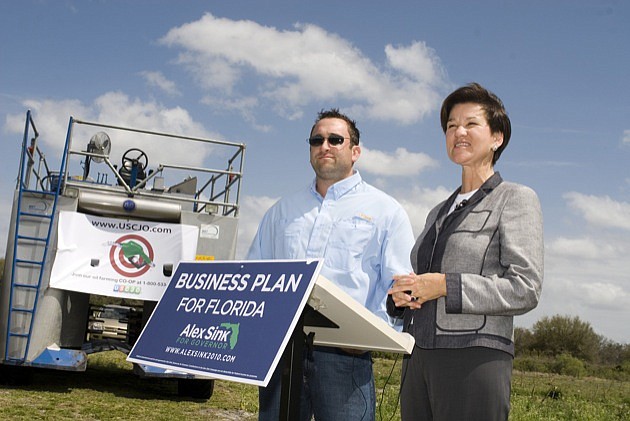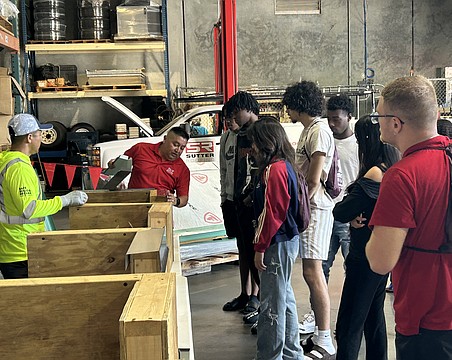Alex Sink is used to breaking the mold.
She traveled a long ways culturally from her tobacco farming roots in Mount Airy, N.C. to earn a college degree in math. She is credited with breaking “the glass ceiling” by becoming the first woman to lead a major Florida bank — the predecessor of Bank of America.
She broke the mold to become the first woman to be elected Chief Financial Officer of Florida, and is now running for governor as the leading Democrat candidate. If elected, she would break the mold again to become the first female governor.
“She's a rare person, because back then for a woman to enter the field of mathematics was pretty unusual,” says former banking colleague Christine Jennings, who ran unsuccessfully as a Democrat for Congress' 13th District and is an ardent supporter of Sink.
Sink points back to her childhood love of numbers.
“I have always loved solving problems and numbers — ever since my dad would let me sit with him and write the checks for our family farm at the kitchen table,” she says. “That love of numbers and of problem-solving is what made me decide to become a math major and to start in banking.”
Even as a candidate, Sink continues to break the mold as a Democrat who brings substantially more business background to her campaign than her main Republican opponent, Attorney General Bill McCollum, who has spent most of his adult life in politics and as a Navy lawyer.
“She knows how to run a business, and I think that's a positive,” says BB&T's Florida president, Bill Klich, who has known Sink since the late 1980s.
But Adelaide “Alex” Sink has retained her southern accent, her loyalty to her North Carolina alma mater — Wake Forest University, where her daughter now attends school — and her agricultural roots. She is making her knowledge of agriculture issues — in a state where those are sometimes overlooked — a major part of her campaign.
The former banker-turned-politician draws on her farm upbringing to see agriculture as a key ingredient of what she calls her “Three R” business plan — a five-page platform taking center stage in her run for governor.
Critics contend that her business plan is something that did not break any molds — that it mostly draws on retread ideas for more government activism in trying to spark the right kinds of business.
Sink knows the importance of small business, whether it is to banking, the economy or politicians running for office, and her “Three R” business plan takes aim at that target.
But it does not require a math degree to see the challenge ahead of her, as she is consistently down in the polls to McCollum, although she is as close as 4 points in one. Though she led in fundraising at the end of 2009, Sink knows an aggressive strategy is needed to revive, remake and reform her own campaign. She hopes that strategy lies in the “Three R” plan.
While Sink, who oversees 2,000 employees, has her work cut out for her, she seems ready. “I'm going to be a very strong champion, particularly for small business and a business plan focused on turning our economy around and getting people back to work,” she says.
On a March campaign trek through windy Southwest Florida, the slender 61-year old rolled out her plan to “revive” the state's economy in the short term, “remake” it in the long term, and “reform” state government.
On Sink's nearly two-hour stop at a 1,000-acre biofuel plantation in Hendry County, she felt right at home, and showed she retains a good handle on farming techniques and equipment. The visit was part of the “remake” component of her plan, which aims to shift the state's economy to more renewable energy industries and be less dependent on tourism and real estate.
'A huge investment'
“We ought to be the number one solar state in the country, and we're not,” Sink says. She also wants more focus on university research and bringing researchers' patents through to commercial development.
Touring the farm in the front seat of a pickup truck driven by her host, farmer and USCJO President Bill Vasden, Jr., Sink learned how the farm is integrating bio-diesel production into a traditional citrus and cattle operation.
CJO stands for “Crude Jatropha Oil,” the primary product of a feedstock crop that has become all the rage as a non-food alternative energy producer requiring little fertilizer or water. The plants can live more than 50 years and produce oil similar to vegetable oil from sizable seeds. All farm equipment can run on it, and it can be easily refined to bio-diesel fuel onsite.
“It's going to be a huge investment for our future. It's part of making our country less reliant on foreign fuel sources,” Sink told a small gathering of farmhands, reporters and her campaign entourage.
That's music to Vasden's ears. He says, “Feedstock farming and renewable crops have gotten very little political support so far through Tallahassee and certainly through the federal level.”
Candidate Sink spoke from the middle of a field set aside for growing jatropha trees, and intercrops such as camelina, canola and kenaf planted between Vasden's rows of jatropha trees.
The plants and trees are harvested throughout the growing seasons and converted to bio-diesel oil used in part to run the farm's equipment, but also provides high protein stubble for cattle. For farmers faced with citrus greening nightmares and low beef prices, biofuels may someday save the farm.
Vasden also says farmers need help getting bio-diesel refineries and biomass conversion facilities financed and permitted.
Yet, when asked later about her views on harvesting oil and natural gas from state waters to create jobs and shore up state finances, Sink was much less enthusiastic. This, despite the 5,000 jobs a new study says the oil and gas industry might create or billions in new state revenue expected to flow from it over 20 years. She says it's “shortsighted” and risks the state's $50 billion tourism industry.
Stealing 'Three R' thunder
Sink is also focused on corporate income tax credits, cutting red tape by streamlining permitting and government processes, marketing the state for tourism and new retirees, and investing in the state's transportation infrastructure.
But the same week in mid-March Sink visited the Gulf Coast, the state Senate approved a three-year $187 million jobs bill 38-0 that includes some of the same types of programs as her plan: corporate tax credits for hiring Florida workers, streamlining permitting, and ways to commercialize university research projects. A less expensive proposed committee bill is working its way through the Finance and Tax Council.
Gov. Charlie Crist has already recommended nearly $300 million in incentives and direct business tax credits. And the Legislature has also moved on ethics, employee pensions, a truth-in-lobbying law, and campaign financing bills to reform state government.
Ironically, Sink's fellow Democrats successfully fought to weaken the jobs bill helping to pass eight out of 12 floor amendments. Some of those amendments removed streamlining provisions that would have limited local governments' oversight of environmental permitting.
That weakening of the bill seems to be at cross-purposes with Sink, who understands what it means to reduce time to market by getting away from what she criticizes as a “linear approach” to permits.
“We could permit businesses to go for their permitting parallel as opposed to one by one, which drives up the process and it takes too long,” she says.
With Florida's unemployment hovering above 12%, Sink and other gubernatorial candidates have an uphill climb to economic recovery, but also a greater talking point for the need for an economic plan. Sink uses the unemployment data to rally support for her plan, claiming it will, “revive our economy now to create jobs quickly and remake our economy for a stronger future.”
The “Three R” plan, although it may lack originality, temporarily gave Sink an advantage over her competition because she was first. But McCollum has now unveiled his own, with Steve Forbes at his side, and they have a few similarities, such as streamlining red tape and cutting the corporate tax.
Just another politician?
In some ways, Sink can come across as a fresh breath because of her business background and lack of political experience.
When she was president of NationsBank Florida in 1993, The American Banker said the firm, with $22 billion in assets, was the largest bank in the country run by a woman.
While Sink has much less political experience than McCollum, there are issues where she comes off as being your basic politician — answering without answering.
Regarding the U.S. Environmental Protection Agency's proposed stringent clean water nutrient standards being foisted on farmers, utilities and other industries, Sink says, “... we're in a very precarious economic time in our state right now, and no one can afford more burdens in this economy.”
So does she oppose it? Her answer suggests she may be content to kick it down the road until times are better, and not work to get the standards changed.
Fellow Florida cabinet member, Republican Agriculture Commissioner Charles Bronson, is more adamant on the standards, saying they endanger the state's $111 billion farming industry.
When it comes to expanding gaming, Sink first wants to protect the existing pari-mutuels — dog tracks, horse tracks and Jai-Lai — and she has plenty of legislators with those operations in their districts on her side. They're also clamoring to offer banked card games like Black Jack or have slots.
But places like Tampa's Seminole Hard Rock Casino, just a couple miles from Sink's home, are a big draw for tourists and the retirees her plan targets. A state economist pinpointed all eight Gulf Coast counties as prime areas for auctioning gaming licenses (see the Business Review March 26, 2010). Still, Sink says, “ ... I don't really see gaming as one of the key pillars of how we build our economy.”
Property insurance rates are also problematic for Sink and the state's businesses. Last year, Sink was the only cabinet member asking Insurance Commissioner Kevin McCarty the tough questions about hugely overstating new capital coming into the state since the 2007 property insurance reforms.
That assertiveness may help explain her strong support from the insurance industry seen in her long list of campaign contributors. But at the March cabinet meeting Sink joined the consensus for yet more regulation.
Despite last year's strong financial support from the insurance industry she regulates, she's now not a fan of proposed legislation aimed at improving the solvency of property insurers.
The “Consumer Choice Act,” overwhelmingly approved by the Legislature last year, but vetoed by Crist, has been redrafted to require more capital to go into business, allow more property insurers rate flexibility, and encourage insurers to stay in the state. And because Crist planned to veto it again, legislators yanked it.
But Sink calls it the “deregulation bill,” suggesting she is not interested in market-based reforms to keep more insurance companies from fleeing the state.
At heart, Alex Sink is a businesswoman. And she out-raised McCollum through end of 2009 $6.6 million to $4.4 million. But her fundraising has since slowed some as McCollum outraised her in the first quarter, $1.4 million to $1.1 million, and some Democrats are unhappy with her lagging campaign. That resulted in a shakeup of her campaign staff in mid-April, including the addition of a deputy campaign manager for finance.
How much they continue to raise and how they choose to spend it may be the only business plan that matters for now, and may help to determine if Florida's next governor will have a North Carolina accent.
Unique family tree
A claim to fame that Democrat gubernatorial candidate Alex Sink does not tout much is that she is a great-granddaughter of Chang and Eng Bunker, the famous conjoined “Siamese Twins” who settled on a 110-acre farm near Mount Airy after spending years as a P.T. Barnum circus act. She was interviewed about her ancestry by National Geographic in 2006.
Chang and Eng married sisters and had 21 children between them. Sink's real name comes from Chang's wife, Adelaide Yates.
Sink also has a less unique but still unusual progeny: Her son, Bert, is a 6'3”, 303-pound, junior center on the Stanford Cardinal football team.
Sink is known to be a big sports fan, must now split her loyalties between her Wake Forest Demon Deacons — where daughter Lexi attends college — and Stanford.
And finally, Sink is married to Bill McBride, who was trounced by Jeb Bush when McBride ran as the Democrat candidate for governor in 2006.
Sink and McBride now live on Lake Thonotosassa in Hillsborough County.
Alex Sink's Jobs Plan
• Revive our economy in the short term
• Improve small business access to capital, including incentives for venture capital investing and micro-loans.
• Encourage small and start-up businesses by pushing to defer state corporate income taxes of qualified start-up businesses for the first three years.
• Provide a corporate income tax credit tied to creating jobs.
• Give preferences in state contracts to businesses that employ Floridians.
• Cut red tape by streamlining permitting and regulatory decisions without gutting environmental and public safety protections.
• Market Florida more aggressively for both visitors and conventions.
• Attract new retirees to jumpstart the housing market.
• Encourage construction on roads, rail networks, ports, airports and aerospace infrastructure.
• Remake our economy for the long term
• Expand research and development through R&D tax credits for in-state investment.
• Boost partnerships between university faculty and private industry to pursue entrepreneurial ventures and commercialize research results.
• Streamline operations by improving services, while reducing unnecessary expenses and wasteful practices.
• Build the best-educated, best-trained workforce in the country through more effective investment.
• Reform our government to create a climate of confidence and prosperity
• Create performance metrics and a statewide efficiency review.
• Streamline government processes.
• Develop a Florida Performance Scorecard: specific targets for job creation and employment expansion; fiscal accountability; educational achievement; improvements in health and safety.
• Create performance contracts for all top state managers.
• Apply specific, measurable performance standards to her own job as governor.






